完整不定代词的用法讲解及练习题
(完整版)不定代词othersanther用法与练习

(完整版)不定代词othersanther用法与练习引言在英语中,不定代词是一类特殊的代词,用于代替不确定或未指明具体对象的情况。
其中,others和another是两个常用的不定代词。
本文将介绍它们的用法和提供一些练,以帮助提高对它们的理解和运用。
不定代词others的用法1. 具体对象的代替不定代词others用于代替一个或多个具体的对象,表示除了已提及的对象之外的其他人或事物。
例句:- I have finished my work, but others are still working.- Some people like apples, while others prefer oranges.2. 表示多种选择不定代词others还可以用于表示多种选择中的其他选项。
例句:- Some people enjoy swimming, hiking, or cycling, among others.3. 复数形式的代替不定代词others可以替代复数名词,表示复数或未指明数量的事物。
例句:- The students brought their books, pencils, and others for the class.不定代词another的用法1. 指代一个额外的事物不定代词another用于表示额外的、与已提及的事物类似的事物。
例句:- I have finished one book, and now I am starting another.2. 表示另一个选择不定代词another还可以表示另一个可选的选择。
例句:- I don't like this color, show me another.3. 表示重复的动作或情况不定代词another还可以用于表示重复的动作或情况。
例句:- He made the same mistake again. He needs to try another approach.练请根据下列句子中的上下文,选择合适的不定代词填空。
完整不定代词的用法讲解及练习题答案
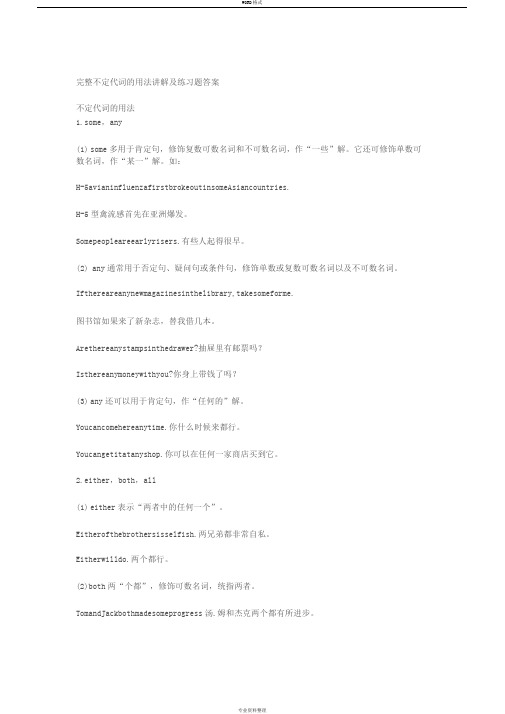
完整不定代词的用法讲解及练习题答案不定代词的用法1.some,any(1)some多用于肯定句,修饰复数可数名词和不可数名词,作“一些”解。
它还可修饰单数可数名词,作“某一”解。
如:H-5avianinfluenzafirstbrokeoutinsomeAsiancountries.H-5型禽流感首先在亚洲爆发。
Somepeopleareearlyrisers.有些人起得很早。
(2)any通常用于否定句、疑问句或条件句,修饰单数或复数可数名词以及不可数名词。
Ifthereareanynewmagazinesinthelibrary,takesomeforme.图书馆如果来了新杂志,替我借几本。
Arethereanystampsinthedrawer?抽屉里有邮票吗?Isthereanymoneywithyou?你身上带钱了吗?(3)any还可以用于肯定句,作“任何的”解。
Youcancomehereanytime.你什么时候来都行。
Youcangetitatanyshop.你可以在任何一家商店买到它。
2.either,both,all(1)either表示“两者中的任何一个”。
Eitherofthebrothersisselfish.两兄弟都非常自私。
Eitherwilldo.两个都行。
(2)both两“个都”,修饰可数名词,统指两者。
TomandJackbothmadesomeprogress汤.姆和杰克两个都有所进步。
Bothofthemshouldmakeconcessions.他们双方都应做出让步。
(3)all全“部,所有的”,修饰可数名词和不可数名词,指两个以上的人或物。
Allthestudentscontributedtothefund.所有的学生都为基金会捐了款。
Allofthemoneyhasbeenspent.钱都花完了。
Weareallforyou.我们都支持你。
Sayallyouknowandsayitwithoutreserve.知无不言,言无不尽。
(完整版)不定代词用法及练习

不定代词不指明代替任何特定名词或形容词的代词,在句中可作主语、表语、宾语和定语。
Ⅰ.不定代词包括:all , both, every, each, either, neither, more,(a) little, (a) few, much, many, another, other, some, any , one以及some, something, anything, everything, somebody, someone, anybody, anyone, nothing , nobody,no one, none, everybody, everyone.等。
一般来讲,修饰不定代词的词要置于其后。
Ⅱ,不定代词用法为:不定代词+(of + 限定词)+ 名词注意:of 后一定要有限定词both, all可以直接接限定词theⅢ.几组常用不定代词的区别:1.代词比较one,that 和itone表示泛指,指名称相同的另一物,或所提到的人或物中的一个。
that和it 表示特指。
that 与所指名词为同类,但不是同一个,而it 与所指名词为同一个。
I can't find my hat. I think I must buy one.The hat you bought is bigger than that I bought.I can't find my hat. I don' t know where I put it.2. some与any的区别1)some多用于肯定句,表示“一些,几个”作形容词时,后面可以接①不可数名词+单数动词;②可数名词+复数动词。
Look! Some of the students are cleaning the library.Some rice in the bag has been sold out.2)any多用于疑问句、条件句和否定句中,表示“一些,任何”用作形容词时,后面可以接①不可数名词+单数动词;②可数名词+复数动词。
总复习(四)不定代词用法与练习题

总复习(四)不定代词用法与练习题Mr. Liu 2012-4-5不指明代替任何特定名词或形容词的代词叫做不定代词。
一、不定代词的用法不定代词大都可以代替名词和形容词,在句中作主语、宾语、表语和定语。
1.作主语Both of them are teachers.他们两人都是教师。
2.作宾语I know nothing about this person.我对这个人一无所知。
3.作表语This book is too much for a child.这本书对一个小孩来说太难了。
4.作定语There is a little water in the glass.玻璃杯里有一些水。
二、常用不定代词用法举例1.some 一些,某些,某个不定代词some可以代替名词和形容词,常用在肯定句中作主语、宾语、定语等。
作定语时,它可以修饰可数名词(单、复数皆可)和不可数名词。
2.any一些,任何不定代词any可以代替名词和形容词,常用在否定句或疑问句中作主语、宾语、定语等。
作定语时,它可以修饰可数名词(多为复数)和不可数名词。
例如:There isn‘t any ink in my pen.我的钢笔没有墨水。
(作定语)不定代词any有时也可以用在肯定句中,表示"任何的"。
例如:You may come at any time;I‘ll be home the whole day.你任何时候来都行,我整天都将呆在家里。
3.all 全体,所有不定代词all代表或修饰可数名词时,指两个以上的人或物。
作先行词时,引导词用that。
例如:All were present at the meeting.全都到会了。
(作主语,代表可数名词)4.both 全部,都不定代词both指两个人或事物。
5.none 无人或无物不定代词none的含义和all相反,和no one,not any同义,但其用法相当于名词,在句子中一般作主语或宾语。
不定代词的用法及练习

不定代词的用法与练习 ( 第一部分 )表一:表二:单数 单数 ≥3 每一个every 单数 单数 ≥2 每一个 each单数或复数 ○ ≥3 三者或三者以上都不 none 单数或复数 单数或复数 ≥3 三者或三者以上都 all 单数 单数 =2 两者都不 neither 单数 单数 =2 两者中的任何一个 either 复数 复数 =2 两者都 both 作主语时动词的数 作定语时名词的数 数量关系 含义 不定代词1. all 注意下列词组的意义above all after all in all not at all all of sudden all at onceall or nothing all up for all once (and) for all with all all over练习题(并翻译其含义、注意all的用法)1)All _________(be) here and now you may begin your lecture.2)All things ________(be ) difficult before they become easy.3)All that he talked about at the meeting _______(be) something aboutenvironment protection.4)All his money ________(be) spent on spirits and bobacco.5)I love her with _______________ but she doesn’t seem to care ( 全心全意地爱)6)You ca hardly imagine such a little boy eating ________________.( 整个面包)7)You can see smiling faces ______________________( 全中国)8)_______________ was devoted to looking after the disabled children.(他一生)9)She told me the news in _________ honesty. (非常诚实)10)She is all ears whenever she listens to a lecture. _______________11)He is all skin and bones. _______________改错1)All them have passed the important examination .2)I like all them .3)I like them all.4)All of the six girls are from the country side.5)The students all are interested in helping one another in English learningin our class.6)The students like all finished writing their research papers.7)How clever you are all.8)They devoted their all spare time to helping the poor.9)They devoted ________ spare time to helping the poor.A, all their B, their all C, all of their D, of their all __________________(不是所有的学生)understood what the professor was saying.2. each、every①each指代前文的名词②each 、each one 、everyone、every +单数名词、可以用单数或复数的人称代词③each 、each one 、every one与of 连用。
根据完整不定代词的用法讲解及练习题。

根据完整不定代词的用法讲解及练习题。
根据完整不定代词的用法讲解及练题1. 什么是完整不定代词(Indefinite Pronouns)完整不定代词是指用来指代不具体或不确定人或事物的代词,常用来表示数量、身份、归属等含义。
完整不定代词通常用于肯定句和否定句,以及疑问句中。
常见的完整不定代词有:somebody, anybody, nobody, everybody, someone, anyone, no one, everyone, something, anything, nothing, everything等。
2. 完整不定代词的用法完整不定代词可以在句子中作为主语、宾语、表语或定语,具体用法如下:2.1 作为主语- Somebody is waiting for you.(有人在等你。
)- Nobody knows the answer.(没有人知道答案。
)2.2 作为宾语- I saw something strange yesterday.(我昨天看到了一些奇怪的事情。
)- Did you see anyone on the street?(你在街上见到任何人吗?)2.3 作为表语- Everyone is happy about the news.(每个人都对这个消息感到高兴。
)- Her words made everyone angry.(她的话让每个人都生气了。
)2.4 作为定语- Is there anything interesting in the book?(这本书里有什么有趣的内容吗?)- I don't have any money left.(我已经没有任何钱了。
)3. 完整不定代词的练题请根据句子的空白处选择适当的完整不定代词填空。
1. ______ can help me with this problem?- A. Somebody- B. Nothing- C. Everybody- D. Anything2. Mary didn't say ______ about her plans. - A. something- B. nothing- C. anything- D. everything3. ______ has the key to the office?- A. Anybody- B. Everybody- C. Nobody- D. Somebody4. Put ______ on the table, please.- A. anything- B. something- C. everything- D. nothing5. ______ wants to go to the party tonight.- A. Someone- B. Everyone- C. No one- D. Anyone【答案】1. A2. B3. D4. B5. D参考答案1. 考察表示请求帮助的句子,应选用完整不定代词"Somebody"。
(完整)初中英语不定代词讲解及习题.doc

不定代词一、不定代词概述定义不指明代替任何特定名词或形容词的代词常 见 some 类something, somebody, someone不 不 定 any 类 定 代词 no 类 代 every 类词其他all, each, both, none, one, much, many, (a)few, (a)little, either, neither,other, another充 当 作主语、宾语、表语、定语等成分二、常见不定代词的基本用法1、 some 和 any: 都是“一些”的意思,都可与可数名词复数或不可数名词连用。
(1) some 一般用于肯定句中, any 一般用于否定句或疑问句中。
Eg. ______________________________________________________________________________________________________________________(2) 在表示请求、建议或希望得到肯定回答的疑问句中,应该用some而不用any 。
Eg. Would you please give me some paper?___________________________________________________________(3) 当 any 读。
表示“任何”或“无论哪一个”的意义时,可以用于肯定句,此时any 要重Eg. You may come at any time that is convenient to you.___________________________________________________________2、 表示数量的不定代词(1)many______, few_______, a few_______, 用以代替或修饰可数名词。
(2)much______, little_______, a little________, 用以代替或修饰不可数名词。
(完整版)不定代词用法总结及配套练习题

不定代词用法总结1) some, any的用法some和any通常用于表示不定数或不定量,修饰复数可数名词或不可数名词。
some表示“几个;一些;部分”,多用于肯定句;而any表示“一些;什么;任何;”,对用于否定句或疑问句中。
如:* He asked me some questions. (他问了我几个问题。
)* Some of the bread has been eaten. (面包已吃了一些。
)* Are there any stamps in this post office? (这个邮局里有邮票吗?)1. "Would you like _____ more coffee?" (some/any) -------"Yes, please."2. I wonder if _____ will show up at the meeting. (someone/anyone)3. Doesn't _____ know the answer to this question? (someone/anyone)4. On TV _____ said that smoking does not cause lung cancer. (someone/anyone)5. (annoyed and emphatic) How can _____ tell such a pack of lies ? (someone/anyone)6. It must be difficult to live without _____ money. (some/any)7. Have you seen my shoes? I can't find them _____. (somewhere/anywhere)8. - "Can you believe we've run out of milk!"- "Would you like me to get _____ at the nearest shop?" (some/any)9. _____ say the Internet is just a hype and that it will blow over. (Some/Any)10. _____ day peace will come to Northern Ireland. (Some/Any)2) 复合不定代词的用法a. 不定代词some, any, no与-one, -body, -thing可以组成九个复合代词。
(完整版)不定代词用法总结及配套练习题
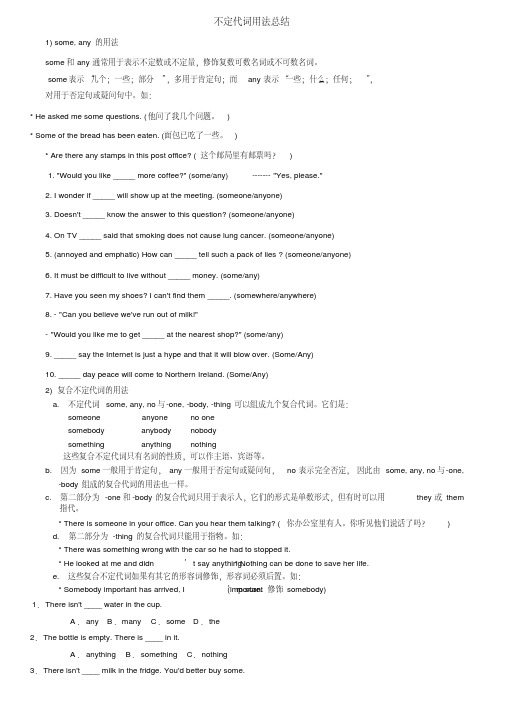
不定代词用法总结1) some, any的用法some和any通常用于表示不定数或不定量,修饰复数可数名词或不可数名词。
some表示“几个;一些;部分”,多用于肯定句;而any表示“一些;什么;任何;”,对用于否定句或疑问句中。
如:* He asked me some questions. (他问了我几个问题。
)* Some of the bread has been eaten. (面包已吃了一些。
)* Are there any stamps in this post office? (这个邮局里有邮票吗?)1. "Would you like _____ more coffee?" (some/any) -------"Yes, please."2. I wonder if _____ will show up at the meeting. (someone/anyone)3. Doesn't _____ know the answer to this question? (someone/anyone)4. On TV _____ said that smoking does not cause lung cancer. (someone/anyone)5. (annoyed and emphatic) How can _____ tell such a pack of lies ? (someone/anyone)6. It must be difficult to live without _____ money. (some/any)7. Have you seen my shoes? I can't find them _____. (somewhere/anywhere)8. - "Can you believe we've run out of milk!"- "Would you like me to get _____ at the nearest shop?" (some/any)9. _____ say the Internet is just a hype and that it will blow over. (Some/Any)10. _____ day peace will come to Northern Ireland. (Some/Any)2) 复合不定代词的用法a. 不定代词some, any, no与-one, -body, -thing可以组成九个复合代词。
(完整版)不定代词otherothers用法与练习

(完整版)不定代词otherothers用法与练习不定代词"other"和"others"的用法与练不定代词是表示不确定对象或数量的词语。
"other"和"others"是常见的两个不定代词,它们在句子中有着不同的用法和含义。
本文将介绍它们的使用规则并提供练,以帮助加深理解。
1. "other"的用法- "other"作为形容词,表示"其他的"或"别的"。
它可以修饰名词,并在句子中充当定语的角色。
- 例1:I have two pens. The other pen is blue.(我有两支钢笔。
另一支是蓝色的。
)- "other"作为代词,表示"其他人"、"其他事物"或"其他的一个"。
它可以代替先前提到的事物或人,并在句子中充当主语、宾语或指示代词的角色。
- 例3:He took one book, and I took the other.(他拿了一本书,我拿了另一本。
)- 例4:Some people like coffee, while others prefer tea.(有些人喜欢咖啡,而另一些人则喜欢茶。
)2. "others"的用法- "others"作为代词,表示"其他人"、"其他事物"或"其他的人"。
它常常与"the"连用,并在句子中充当主语或宾语的角色。
- 例5:Some students like English, and others prefer math.(一些学生喜欢英语,其他的则更喜欢数学。
)- 例6:Some books are interesting, while others are boring.(有些书很有趣,其他的则很无聊。
复合不定代词用法和练习 含答案

复合不定代词用法和练习含答案复合不定代词是英语中常用的一种代词形式,由"some"、"any"、"no"、"every"、"one"等词与"thing"、"body"、"where"等词组合而成。
它们可以用来指代不确定的人、事物、地点等,并在句子中承担名词的作用。
本文将介绍复合不定代词的用法,并提供一些练习题供大家练习。
一、复合不定代词的用法1. 不定代词 "some" + 不定代词 "one" = "someone"、"somebody"例句:Someone left their umbrella in the classroom.(有人把伞落在教室里了。
)2. 不定代词 "any" + 不定代词 "one" = "anyone"、"anybody"例句:Did anyone see what happened?(有人看见发生了什么吗?)3. 不定代词 "no" + 不定代词 "one" = "no one"、"nobody"例句:Nobody knows the answer to this question.(没有人知道这个问题的答案。
)4. 不定代词 "every" + 不定代词 "one" = "everyone"、"everybody"例句:Everyone is invited to the party.(每个人都被邀请参加派对。
不定代词知识点详解及练习(初中英语专题复习)
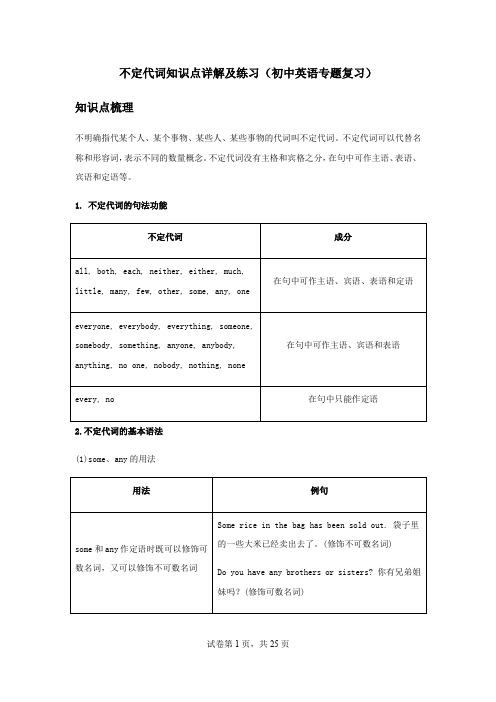
Not all books are good.(= All books are not good. 不是所有的书都是好书。
知识拓展:all作主语,指代人时,谓语动词使用复数形式,指代事情时,谓语动词一般使用单数;作同位语时,all在句中的位置与both相同。
(5)复合不定代词的用法
由some,any,every,no与one,body,thing一起构成的代词叫复合不定代词,如something,everybody,anyone,nothing等。由one和body构成的复合不定代词可相互换用。
用法
例句
复合不定代词一般用作单数,在句中作主语、宾语或表语
If you have any questions, please ask me. 如果你有问题,可以问我。
Any child needs love. 任何一个孩子都需要爱。
some和any可以用来修饰单数名词,some表示"某一";any表示"任何的"
Any student can answer this question. 任何学生都可以回答这个问题
some多用于肯定句;在表示请求、劝告、邀请、或不希望对方拒绝的疑问句中用some而不用any
Some of the boys are good at swimming. 一些男孩擅长游泳。
Will you give me some water? 请给我一些水好吗?
any多用于疑问句、否定句和条件状语从句中;用于肯定句中,表示"任何"
little不多,没有什么
知识拓展:
不定代词讲解及练习
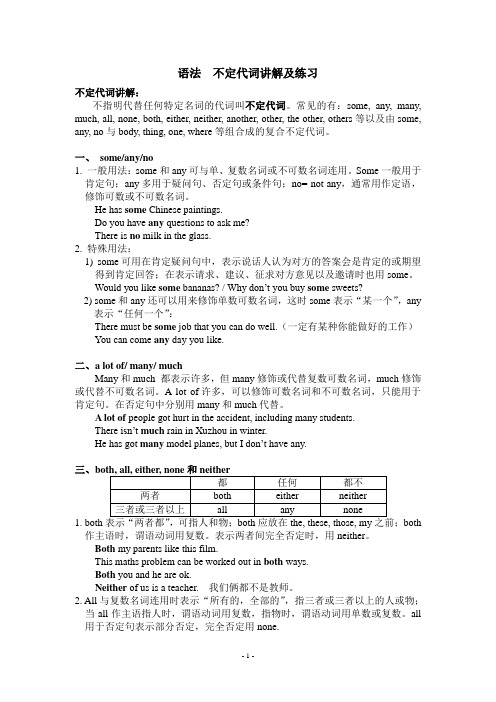
语法不定代词讲解及练习不定代词讲解:不指明代替任何特定名词的代词叫不定代词。
常见的有:some, any, many, much, all, none, both, either, neither, another, other, the other, others等以及由some, any, no与body, thing, one, where等组合成的复合不定代词。
一、some/any/no1. 一般用法:some和any可与单、复数名词或不可数名词连用。
Some一般用于肯定句;any多用于疑问句、否定句或条件句;no= not any,通常用作定语,修饰可数或不可数名词。
He has some Chinese paintings.Do you have any questions to ask me?There is no milk in the glass.2. 特殊用法:1) some可用在肯定疑问句中,表示说话人认为对方的答案会是肯定的或期望得到肯定回答;在表示请求、建议、征求对方意见以及邀请时也用some。
Would you like some bananas? / Why don’t you buy some sweets?2) some和any还可以用来修饰单数可数名词,这时some表示“某一个”,any表示“任何一个”:There must be some job that you can do well.(一定有某种你能做好的工作)You can come any day you like.二、a lot of/ many/ muchMany和much 都表示许多,但many修饰或代替复数可数名词,much修饰或代替不可数名词。
A lot of许多,可以修饰可数名词和不可数名词,只能用于肯定句。
在否定句中分别用many和much代替。
A lot of people got hurt in the accident, including many students.There isn’t much rain in Xuzhou in winter.He has got many model planes, but I don’t have any.三、1. both both 作主语时,谓语动词用复数。
不定代词讲解及练习总结

不定代词讲解及练习总结1. 不定代词的定义不定代词是一类特殊的代词,用来指代人或事物,但没有具体指向的对象。
它们可以在句子中作主语、宾语或定语,并且具有不确定性。
常见的不定代词有:somebody, anybody, nobody, something, anything, nothing等。
2. 不定代词的用法不定代词在句子中的位置和用法与普通的代词相似,根据具体语境决定。
2.1 主语位置不定代词可以作为句子的主语,例如:- Somebody called me yesterday.(有人昨天给我打电话。
)- Anything is possible.(一切皆有可能。
)2.2 宾语位置不定代词可以作为及物动词的宾语,例如:- I can't find anybody here.(我在这里找不到任何人。
)- Have you seen something strange?(你见过什么奇怪的东西吗?)2.3 定语位置不定代词可以用作名词的修饰语,例如:- Is there anything important in the letter?(信中有重要的东西吗?)- I need somebody reliable to help me.(我需要一个可靠的人来帮助我。
)3. 不定代词的练为了更好地掌握不定代词的用法,以下是一些练题:3.1 单项选择题a) Everybodyb) Nobodyc) Anybody2. I don't have ____ to wear to the party.a) somethingb) anythingc) nothing3. ____ is waiting for you outside.a) Somebodyb) Anybodyc) Nobody3.2 句子改写题将以下句子改写成含有不定代词的句子:1. We have a lot of books.(改写成含不定代词的句子)2. The teacher needs a volunteer.(改写成含不定代词的句子)4. 总结不定代词在英语中起着重要的作用,它们可以用来指代不确定的人或事物,并且可以在句子中的不同位置使用。
(完整版)不定代词的用法知识点及练习题(20210212012615)

不定代词1•定义所谓''不上“,就是''不确左处不明确〃的意思,所以不泄代词就是指不明确表示代替某特泄名 词或形容词的代词,如someone 意为''某人",something 意为''某事"或''某物",many 表示 ''许多人"或''许多物",a few 表示''几个人"或''几个事物",等等。
(1)普通不定代词★ some 与 any一般说来,some 用于肯左句中,any 用于否泄句、疑问句和条件句中。
如:① 肯泄句:He asked some questions.他问了一些问题。
② 否定句:He didn't ask any questions.他没有问任何问题。
③ 疑问句:Did he ask any questions?他问了些问题没有?但是•在表示请求、邀请或征求意见的句子中,希望对方的肯定回答、通常要用 some 而不用any 。
如:① Shall I get some for you?要我帮你拿些来吗?② Since you have plenty of them, why not give her some?既然你有那么多,为什么不给她一些呢?any 有时也用于肯定句中,表示''任何"的意思。
如:Any of these may suit you.这些中间的任何一个都可能适合你。
另外,汉语可说''任何……都不〃,但英语不能说any...not a 因为按英语习惯,any 总是要 出现在否定词not 的后面。
而不能出现在它的前面。
如:我想任何学生都回答不了这个问题。
正:I don't think any student can answer this question.IE : I think no student can answer this question.误:I think any student can't answer this question.第一句用的是not...any,故正确;第二句用的是no,相当于not...any,也正确;第三句 用的是any...not,就错了。
完整不定代词的用法讲解及练习题

完整不定代词的用法讲解及练习题1) no表示“没有”,用于肯定句中,修饰可数名词和不可数名词。
There is no milk in the fridge.冰箱里没有牛奶。
No one can deny the XXX.没有人能否认教育的重要性。
2) XXX表示“两者都不”,用于否定句中,修饰两个人或物。
Neither of the ns is XXX.两个选项都不令人满意。
XXX Tom nor Jack is coming to the party.汤姆和XXX都不来参加聚会。
3) none表示“没有一个”,修饰可数名词和不可数名词,用于否定句和疑问句中。
None of the students passed the exam.没有一个学生通过了考试。
None of us knows the answer.我们谁也不知道答案。
No can be used to modify both singular and XXX。
For example。
time and tide wait for no man.XXX of the two ns is correct。
For example。
neither answer is correct.None can be used to indicate that there is not a single person or thing。
and can refer to both countable nouns (when there are more than two people or things) and XXX。
For example。
none of the students failed the XXX.Few means "not many," while a few means "a small number" and is used to modify countable nouns。
不定代词用法总结及配套练习题
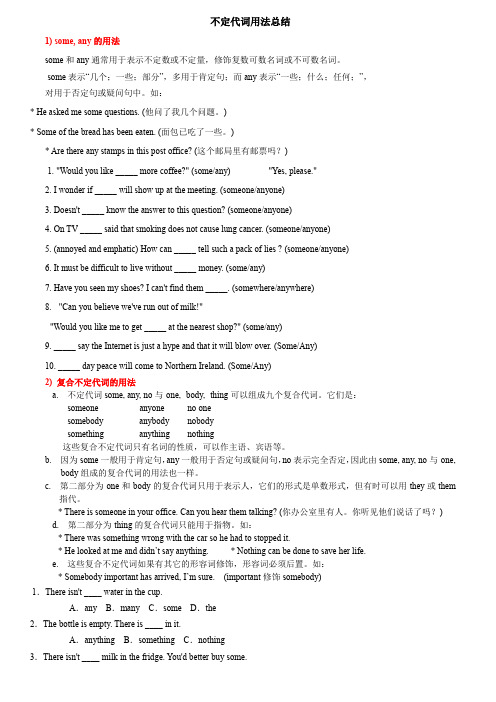
不定代词用法总结1) some, any的用法some和any通常用于表示不定数或不定量,修饰复数可数名词或不可数名词。
some表示“几个;一些;部分”,多用于肯定句;而any表示“一些;什么;任何;”,对用于否定句或疑问句中。
如:* He asked me some questions. (他问了我几个问题。
)* Some of the bread has been eaten. (面包已吃了一些。
)* Are there any stamps in this post office? (这个邮局里有邮票吗?)1. "Would you like _____ more coffee?" (some/any) -------"Yes, please."2. I wonder if _____ will show up at the meeting. (someone/anyone)3. Doesn't _____ know the answer to this question? (someone/anyone)4. On TV _____ said that smoking does not cause lung cancer. (someone/anyone)5. (annoyed and emphatic) How can _____ tell such a pack of lies ? (someone/anyone)6. It must be difficult to live without _____ money. (some/any)7. Have you seen my shoes? I can't find them _____. (somewhere/anywhere)8. - "Can you believe we've run out of milk!"- "Would you like me to get _____ at the nearest shop?" (some/any)9. _____ say the Internet is just a hype and that it will blow over. (Some/Any)10. _____ day peace will come to Northern Ireland. (Some/Any)2) 复合不定代词的用法a. 不定代词some, any, no与-one, -body, -thing可以组成九个复合代词。
全套完整不定代词的用法讲解及练习题

不定代词的用法1.some, any(1)some多用于肯定句,修饰复数可数名词和不可数名词,作“一些”解。
它还可修饰单数可数名词,作“某一”解。
如:H-5 avian influenza first broke out in some Asian countries.H-5型禽流感首先在亚洲爆发。
Some people are early risers.有些人起得很早。
(2)any通常用于否定句、疑问句或条件句,修饰单数或复数可数名词以及不可数名词。
If there are any new magazines in the library, take some for me.图书馆如果来了新杂志,替我借几本。
Are there any stamps in the drawer?抽屉里有邮票吗?Is there any money with you?你身上带钱了吗?(3)any还可以用于肯定句,作“任何的”解。
You can come here any time.你什么时候来都行。
You can get it at any shop.你可以在任何一家商店买到它。
2.either,both,all(1)either表示“两者中的任何一个”。
Either of the brothers is selfish. 两兄弟都非常自私。
Either will do.两个都行。
(2)both“两个都”,修饰可数名词,统指两者。
Tom and Jack both made some progress.汤姆和杰克两个都有所进步。
Both of them should make concessions.他们双方都应做出让步。
(3)all”全部,所有的”,修饰可数名词和不可数名词,指两个以上的人或物。
All the students contributed to the fund.所有的学生都为基金会捐了款。
All of the money has been spent.钱都花完了。
- 1、下载文档前请自行甄别文档内容的完整性,平台不提供额外的编辑、内容补充、找答案等附加服务。
- 2、"仅部分预览"的文档,不可在线预览部分如存在完整性等问题,可反馈申请退款(可完整预览的文档不适用该条件!)。
- 3、如文档侵犯您的权益,请联系客服反馈,我们会尽快为您处理(人工客服工作时间:9:00-18:30)。
不定代词的用法1. some,any(1) some多用于肯定句,修饰复数可数名词和不可数名词,作“一些”解。
它还可修饰单数可数名词,作“某一”解。
如:H-5 avian influenza first broke out in some Asian countries.H-5型禽流感首先在亚洲爆发。
Some people are early risers. 有些人起得很早。
(2) any通常用于否定句、疑问句或条件句,修饰单数或复数可数名词以及不可数名词。
If there are any new magazines in the library, take some for me.图书馆如果来了新杂志,替我借几本。
Are there any stamps in the drawer? 抽屉里有邮票吗?Is there any money with you? 你身上带钱了吗?(3) any还可以用于肯定句,作“任何的”解。
You can come here any time. 你什么时候来都行。
You can get it at any shop. 你可以在任何一家商店买到它。
2. either,both,all(1) either表示“两者中的任何一个”。
Either of the brothers is selfish. 两兄弟都非常自私。
Either will do. 两个都行。
(2) both“两个都”,修饰可数名词,统指两者。
Tom and Jack both made some progress. 汤姆和杰克两个都有所进步。
Both of them should make concessions. 他们双方都应做出让步。
(3) all“全部,所有的”,修饰可数名词和不可数名词,指两个以上的人或物。
All the students contributed to the fund.所有的学生都为基金会捐了款。
All of the money has been spent. 钱都花完了。
We are all for you. 我们都支持你。
Say all you know and say it without reserve. 知无不言,言无不尽。
3. no,neither,none(1) no“不”,可修饰单数和复数可数名词以及不可数名词。
Time and tide wait for no man. 时不我待。
There are no clouds in the sky. 天上没有云。
I have no money for such things. 我没钱买这些东西。
(2) neither“两者中哪个都不”,其所指范围是两个人或物。
Neither answer is correct. 两个答案都不对。
Neither of the two countries is satisfied with the result of the talk.两个国家都不满意会谈的结果。
(3) none“没有一个人或东西”,它既可指可数名词(其所指范围是两个以上的人或物),又可指不可数名词。
All of the trees were cut down, and none was were. left.所有的树都被砍了,一棵也不剩。
None of the students failed the examination.没有一个学生考试不及格。
None of this money is his. 这笔钱没有一点儿是他的。
4. few, a few,little, a little(1) few的意思是“没有几个”; a few的意思是“少数”,“几个”;修饰可数名词; a few表示肯定意义, few 表示否定意义。
The problem is so difficult that few people can solve it.这个问题太难了,几乎没人能做出来。
Only a few people can solve this problem. 只有几个人能解决这个问题。
Few of them want to go. 他们中几乎没有人想去。
A few of them want to go. 他们中有几个人想去。
(2) little“没有多少”,a little“少量”,修饰不可数名词;a little表示肯定意义,little表示否定意义。
如:There is little rainfall this spring. 今年春季雨水很少。
Although it did not rain for the whole month, there is a little water in the pond.虽然整整一个月没下雨了,但池塘里还有一点水。
5. many, much, most(1) many用于修饰可数名词。
Many of the problems have been solved. 大部分问题已经解决了。
Many think that the situation will change soon. 很多人认为局势会很快改变。
(2) much用于修饰不可数名词。
Much of the money has been spent. 这笔钱的大部分已经被花掉了。
They have finished much of the work. 他们已经完成了大部分的工作。
6. another,other,the other,others,the others(1) another指同类中多个东西中的“另一个”(即one more)。
This watch doesn't work, I must get another one.这块表坏了,我该另买一块了。
He went back to work too soon,and was laid up for another three months.他回去上班过早,结果又病倒三个月。
但要注意: other与物主限定词连用也可指余下的另一个或全部。
如:Use your other hand. 用你的另一只手。
Mary is older than me but my other sisters are younger.玛丽比我大,其余的都是我妹妹。
(2) other单独使用时指其他的、另外的人或物。
There must be some other reason for him refusing to help.他不予帮助一定另有原因。
I saw Tom with some other fellow students.我看见汤姆和其他一些同学在一起。
(3) the otherone/ones.指同类中余下的另一个或另一些。
I'll have to use our duplicate key. I lost the other one.我不得不用我们的备用钥匙了,我把那一把丢了。
Where are the other students? 其他学生去哪儿了?One of the murderers was caught, but the other is still at large.一个凶手被抓住了,另一个却依然逍遥法外。
(4) others是other的复数形式,指其他的、另外的人或物。
We should not think only of our children, there are others to be cared for also.我们不应该只想到自己的孩子,还有别的孩子也需要照顾。
Others may object to this plan. 别人可能会反对这个计划。
(5) the others表示同类中余下的全部。
The search party was divided into two groups. Some went to the right, the others went to the left.搜寻小组一分为二,一部分人向右,另一部分向左。
Jenny is cleverer than any of. the others in her class.珍妮比班上的其他(任何)人都聪明。
7. 复合不定代词someone somebody, something, anyoneanybody, anything, no onenobody, nothing, everyone everybody, everything(1) someone, somebody某人和 something某物Someone is asking to see you. 有人要见你。
Someone suggests putting off the meeting. 有人建议推迟会议。
There's something wrong with the machine. 机器出了毛病。
Something strange happened last night. 昨晚发生了件奇怪的事。
(2) anyone, anybody任何人和 anything任何事情Anybody can do this work. It's very simple.这事太简单了,人人都能做。
Did you meet anyone on your way home? 你回家的路上碰到什么人了吗?He faltered:"Is anything wrong?" 他支支唔唔地说:“有什么错吗?”He did not say anything after that. 这以后他再也没说什么。
(3) no one, nobody没有人.和 nothing(没有东西)。
I'm not somebody. I'm nobody. 我不是重要人物,我是个无名小卒。
No one wants to do that. 没人愿做那种事。
Nobody is absent. 没有人缺席。
That's nothing. 那没有什么。
He said he knew nothing about it. 他说他对那事一无所知。
(4) everyone, everybody(每个人)和 everything(每样东西,一切事物)。
She said good-bye to everyone. 她和每个人告别。
Everybody's business is nobody's business. 事关大家无人管。
Everything is ready for the experiment. 实验的一切都准备好了。
